Here are a few subtle or not-so-subtle differences about the Aussie lifestyle to an American visitor (all images are iPhone photos from my AnneRuthmann Instagram feed):

For the most part, Aussies just want to have a great time regardless of where they are. Based on a few different conversations, I get the sense that Americans are perceived to be quite uptight compared to Australians. Rules and regulations are more like guidelines and suggestions for courteous practices in Australia, rather than expectations of appropriate behavior in the United States. "No worries" is probably the most common Australian phrase used on a day-to-day basis.

Wine or beer are pretty much an expected accompaniment to social evening meals. I've tried to get away with not having a glass of something, and I often get met with a look of disappointment or confusion unless I tell people I can't for medical reasons. So, my liver is aging a little more quickly while I'm here just so I can keep up with the Aussie lifestyle.
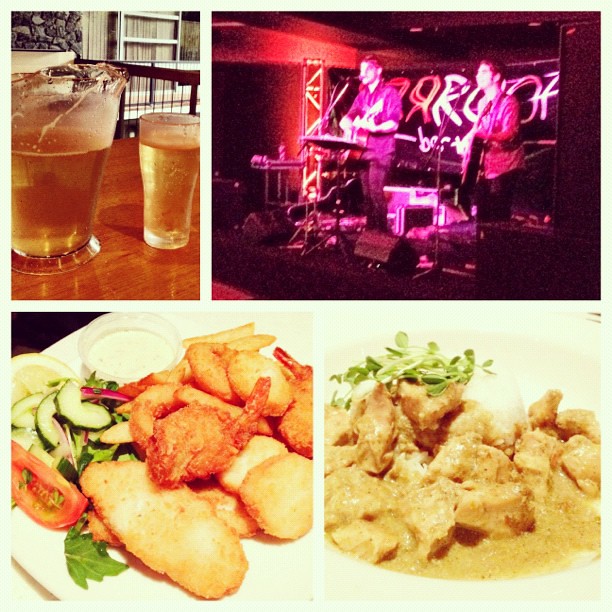
Words are often abbreviated to two syllables and end in "y". So, Stradebroke Island becomes "Straddy", Breakfast is "Brekky", and Barbecue is "Barby". Sometimes word are just completely different, like "Pram" is a baby carriage and "Chooks" are chickens. The following photo is the local Salvation Army resale shop.... notice the name. ;-)
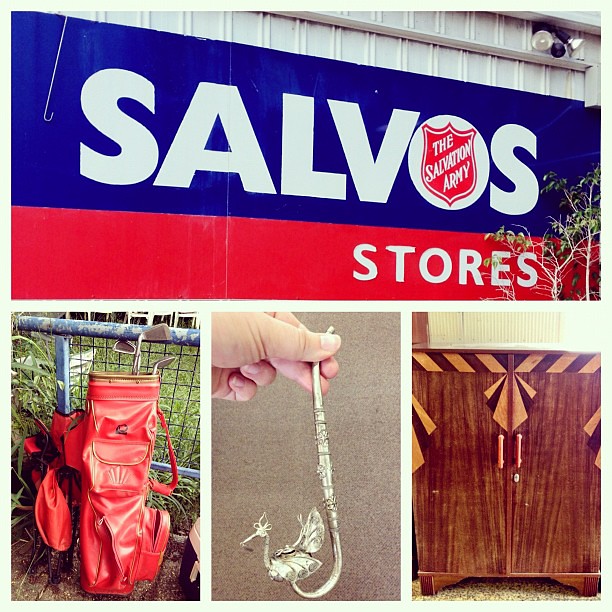

Greetings can sometimes throw me off- like when someone asks, "How you going?" How am I going? By train? Oh... "I'm going good." I'm sure hearing "How you doing?" could be just as strange to Aussies.
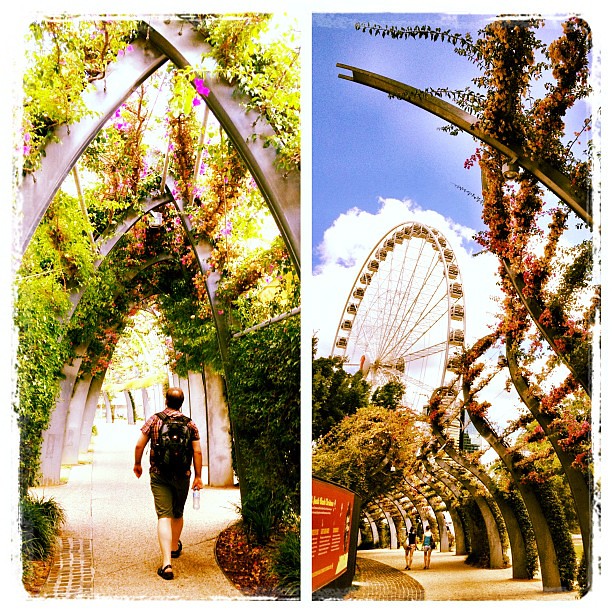 >
>
Public Transportation is for everyone. In Brisbane, it's simply phenomenal, and I can get pretty much anywhere in the city on one pass that goes between ferry, train, or bus. It's so easy, and with gas being so expensive, it's ridiculous not to take advantage of the dedicated busway that cuts through the city just like a subway would.

It's expensive. Similar to living in Manhattan or downtown Boston, "The Rent is Too Damn High!" We got an amazing deal to rent a room in a home that we share with one other person, and we pay $300/week in rent for our room. When you compare it to downtown Boston or New York, it's not really any worse, however, when you factor in that the overall cost of eating out is quite a bit higher because servers are paid a living wage of around $30/hr, it gets pricey real quick. Ironicaly, it's a buyers market on home sales, but it's a sellers market on rentals in Brisbane, which makes it more expensive for visitors. (If you don't already know about "The Rent is Too Damn High Party" check out this remix of Jimmy McMillan's platform talk.)
Sweet chili sauce, beets, and pineapples may make a regular appearance on burgers, and the mangos and apricots are the sweetest versions of the fruits I've had anywhere. Also, rather than getting a salty "ketchup" you're more likely to pay extra for a packet of "tomato sauce" which has a sweeter flavor. A vending machine Coke or Pepsi may set you back $4 or more, but there may be a free water bottle refilling station nearby to encourage drinking healthy. Buying fresh veggies and fruits like Kiwi is pretty inexpensive comparatively, and in the following case, even comes with a "Spife" for eating on the go!

Lamb... not beef or kangaroo... is the true Australian meat. Try asking for a lamb sausage at Outback Steakhouse and see if they have it on the menu- you'll probably be disappointed. You must watch the commercial below in order to grasp the country's attachment to lamb, as well as the very silly sense of humor Aussies have.
It's easy to find work. There aren't a ton of entrepreneurs, but there are lots of people who have a few different part time jobs. Because the minimum wage established for Australia basically protects people from ever feeling like they're poor, the only reason to really work for yourself is to create your own freedom of schedule. I think that the laid back Aussie "no worries" mentality doesn't create the need for independent entrepreneurship, so lots of businesses are owned by foreigners or immigrants who find it very easy to get started and make a life here with just a small bit of hard work. Overall, Aussies believe that work is meant to support the life you want, rather than creating a life that supports the work you want. I dig it.
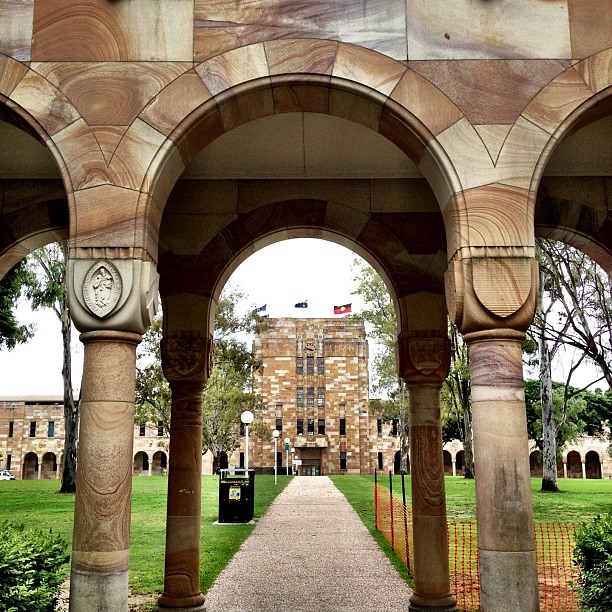
College is not an expectation. Because there often isn't that much difference in salary between someone who has gone to college for 4 years and a "trady" or day laborer, many people don't see the point of college if they can simply get a skilled job that pays well. This may be changing as the immigrant population increases and takes over entry-level jobs, but for now, college is only something people think about when they want a promotion or certification to practice something that requires a degree.

There are a lot of environmentally friendly practices in place such as recycling and garbage bins side by side in all public areas, very few chemically modified ingredients in foods - less preservatives means less transportation and better freshness, half flush toilets for those small flush occasions, homes built to maximize air flow and low energy use, great walkability and bikability every where in the city as well as city cycles you can rent, tax credits for things like solar and energy saving installations, free public stainless steel electric grills in the parks to encourage group dining outdoors, and free public pools for cooling off away from home on hot days. As a side note, the image above is called a Hills Hoist, and is considered an iconic symbol of Australian innovation. Fact: on sunny days in Brisbane, most laundry can dry in 45minutes on the line.

Aside from a different power cord connection, many outlets have switches at the outlet to turn the power on or off for each outlet. I made the mistake several times of forgetting to turn on the outlet switch after plugging in my phone or computer only to realize it after wondering why my battery was on low instead of fully charged. Internet speeds are also fairly abysmal. I'm used to being able to upload gigabytes of images in a short period of time in the states, but in Australia it might take days for the same amount of uploading!
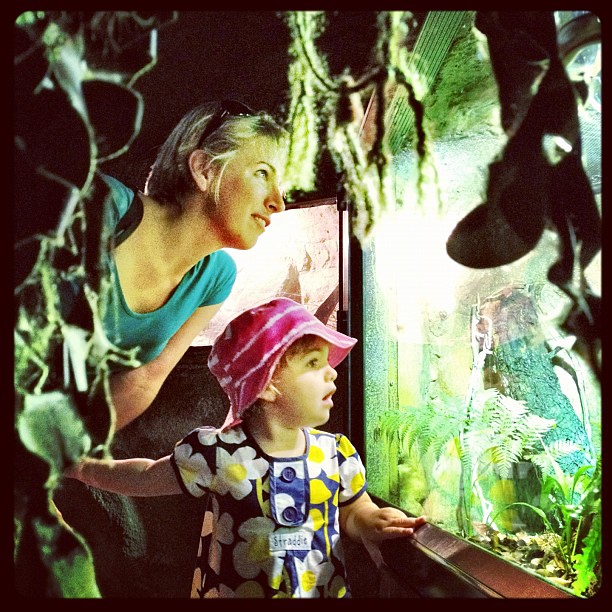
Last but not least, Australians love animals- and in several cases, have even built monuments for them. Americans love pets, but have no problems with harming road kill or shooting at birds, raccoons, or killing moles that destroy their precious yard. Australians, however, have an affection for almost all of the animals in the kingdom, and go to great lengths to protect them, sometimes to the detriment of neighborhood gardens- as is the case with wild turkey running loose around the city. However, for the cutest, most iconic animals that remind you of Australia, you have to go to nature preserves or zoos where their lives have been protected, because most native Australian animals are quite lazy and not all that great at doing more than eating leaves, laying around, and sleeping like this wombat at a state protected nature park...

Of course you'll find differences and these generalizations don't apply 100% of the time, but it's a fairly good overview of the subtle cultural differences between living in the United States and Australia. Personally, I think it's a bit of a utopia here and if it weren't for having so many family members back in the states, I wouldn't mind living here indefinitely. ;-)
If you're ready to visit Australia, you'll need to start by applying for the appropriate VISA online:
https://immi.homeaffairs.gov.au/visas/getting-a-visa/visa-listing
Have any questions about what it's like to live in Australia? Let me know in the comments below!

For the most part, Aussies just want to have a great time regardless of where they are. Based on a few different conversations, I get the sense that Americans are perceived to be quite uptight compared to Australians. Rules and regulations are more like guidelines and suggestions for courteous practices in Australia, rather than expectations of appropriate behavior in the United States. "No worries" is probably the most common Australian phrase used on a day-to-day basis.

Wine or beer are pretty much an expected accompaniment to social evening meals. I've tried to get away with not having a glass of something, and I often get met with a look of disappointment or confusion unless I tell people I can't for medical reasons. So, my liver is aging a little more quickly while I'm here just so I can keep up with the Aussie lifestyle.

Words are often abbreviated to two syllables and end in "y". So, Stradebroke Island becomes "Straddy", Breakfast is "Brekky", and Barbecue is "Barby". Sometimes word are just completely different, like "Pram" is a baby carriage and "Chooks" are chickens. The following photo is the local Salvation Army resale shop.... notice the name. ;-)


Greetings can sometimes throw me off- like when someone asks, "How you going?" How am I going? By train? Oh... "I'm going good." I'm sure hearing "How you doing?" could be just as strange to Aussies.
 >
>Public Transportation is for everyone. In Brisbane, it's simply phenomenal, and I can get pretty much anywhere in the city on one pass that goes between ferry, train, or bus. It's so easy, and with gas being so expensive, it's ridiculous not to take advantage of the dedicated busway that cuts through the city just like a subway would.

It's expensive. Similar to living in Manhattan or downtown Boston, "The Rent is Too Damn High!" We got an amazing deal to rent a room in a home that we share with one other person, and we pay $300/week in rent for our room. When you compare it to downtown Boston or New York, it's not really any worse, however, when you factor in that the overall cost of eating out is quite a bit higher because servers are paid a living wage of around $30/hr, it gets pricey real quick. Ironicaly, it's a buyers market on home sales, but it's a sellers market on rentals in Brisbane, which makes it more expensive for visitors. (If you don't already know about "The Rent is Too Damn High Party" check out this remix of Jimmy McMillan's platform talk.)
Sweet chili sauce, beets, and pineapples may make a regular appearance on burgers, and the mangos and apricots are the sweetest versions of the fruits I've had anywhere. Also, rather than getting a salty "ketchup" you're more likely to pay extra for a packet of "tomato sauce" which has a sweeter flavor. A vending machine Coke or Pepsi may set you back $4 or more, but there may be a free water bottle refilling station nearby to encourage drinking healthy. Buying fresh veggies and fruits like Kiwi is pretty inexpensive comparatively, and in the following case, even comes with a "Spife" for eating on the go!

Lamb... not beef or kangaroo... is the true Australian meat. Try asking for a lamb sausage at Outback Steakhouse and see if they have it on the menu- you'll probably be disappointed. You must watch the commercial below in order to grasp the country's attachment to lamb, as well as the very silly sense of humor Aussies have.
It's easy to find work. There aren't a ton of entrepreneurs, but there are lots of people who have a few different part time jobs. Because the minimum wage established for Australia basically protects people from ever feeling like they're poor, the only reason to really work for yourself is to create your own freedom of schedule. I think that the laid back Aussie "no worries" mentality doesn't create the need for independent entrepreneurship, so lots of businesses are owned by foreigners or immigrants who find it very easy to get started and make a life here with just a small bit of hard work. Overall, Aussies believe that work is meant to support the life you want, rather than creating a life that supports the work you want. I dig it.

College is not an expectation. Because there often isn't that much difference in salary between someone who has gone to college for 4 years and a "trady" or day laborer, many people don't see the point of college if they can simply get a skilled job that pays well. This may be changing as the immigrant population increases and takes over entry-level jobs, but for now, college is only something people think about when they want a promotion or certification to practice something that requires a degree.

There are a lot of environmentally friendly practices in place such as recycling and garbage bins side by side in all public areas, very few chemically modified ingredients in foods - less preservatives means less transportation and better freshness, half flush toilets for those small flush occasions, homes built to maximize air flow and low energy use, great walkability and bikability every where in the city as well as city cycles you can rent, tax credits for things like solar and energy saving installations, free public stainless steel electric grills in the parks to encourage group dining outdoors, and free public pools for cooling off away from home on hot days. As a side note, the image above is called a Hills Hoist, and is considered an iconic symbol of Australian innovation. Fact: on sunny days in Brisbane, most laundry can dry in 45minutes on the line.

Aside from a different power cord connection, many outlets have switches at the outlet to turn the power on or off for each outlet. I made the mistake several times of forgetting to turn on the outlet switch after plugging in my phone or computer only to realize it after wondering why my battery was on low instead of fully charged. Internet speeds are also fairly abysmal. I'm used to being able to upload gigabytes of images in a short period of time in the states, but in Australia it might take days for the same amount of uploading!

Last but not least, Australians love animals- and in several cases, have even built monuments for them. Americans love pets, but have no problems with harming road kill or shooting at birds, raccoons, or killing moles that destroy their precious yard. Australians, however, have an affection for almost all of the animals in the kingdom, and go to great lengths to protect them, sometimes to the detriment of neighborhood gardens- as is the case with wild turkey running loose around the city. However, for the cutest, most iconic animals that remind you of Australia, you have to go to nature preserves or zoos where their lives have been protected, because most native Australian animals are quite lazy and not all that great at doing more than eating leaves, laying around, and sleeping like this wombat at a state protected nature park...

Of course you'll find differences and these generalizations don't apply 100% of the time, but it's a fairly good overview of the subtle cultural differences between living in the United States and Australia. Personally, I think it's a bit of a utopia here and if it weren't for having so many family members back in the states, I wouldn't mind living here indefinitely. ;-)
If you're ready to visit Australia, you'll need to start by applying for the appropriate VISA online:
https://immi.homeaffairs.gov.au/visas/getting-a-visa/visa-listing
Have any questions about what it's like to live in Australia? Let me know in the comments below!




